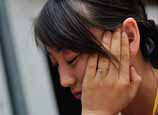
Life expectancy is dropping in Shanghai. But the city's air quality is not to blame, a health official said yesterday.
In 2012, the city's life expectancy was 82.41 years, a slight decrease of 0.1 compared to 2011, according to a report by the Shanghai Civil Affairs Bureau.
Life expectancy had been rising for more than seven years in a row. The figure should have increased, but the dip had no relation to air quality or the medical care system, a Shanghai Health Bureau official surnamed Zhang said yesterday. He did not elaborate.
Life expectancy for women was 84.6, compared with 80.2 for men.
Diseases of circulatory system, tumors and diseases of respiratory system were the top three killers of people over the age of 60 in the city, officials said.
Meanwhile, the old-age dependency ratio reached 39.3, or 39.3 senior citizens to every 100 people of working age, meaning five people of working age (15 to 59) support two people over the age of 60, according to the report.
The old-age dependency ratio is an index used to calculate the impact of an aging society from an economic perspective. In 2011, the figure was 36.6.
The increase in the number of citizens over the age of 60 in the city's population rose by 5.6 percent last year, the bureau said. They accounted for around 25 percent of those with permanent residency. Among them, 1,251 were centenarians, of whom 77 percent were women.
The Pudong New Area and Xuhui and Huangpu districts boasted the largest number of centenarians, while Jing'an District had the largest percentage of centenarians and people over 60.
In Shanghai, nearly 2 million people over 60 are parents in one-child families, said Gao Julan, deputy director of the bureau.
"The city is confronted with a rapidly aging society, which poses great challenges as the city's senior care resources are limited," Gao said.
The city has 233,500 older people living alone, and there is a severe shortage of care workers, many of whom are reaching retirement age themselves, Gao said.
At the end of last year, the city had more than 600 registered nursing homes, with 105,200 beds, an increase of 3.3 percent from a year earlier. The number of beds accounted for just 2.9 percent of the over-60s population.
Shanghai plans to add another 5,000 beds in senior care facilities by the end of the year in an effort to ease the acute shortage.
















 How real life is, how real love is!
How real life is, how real love is!


![]()
